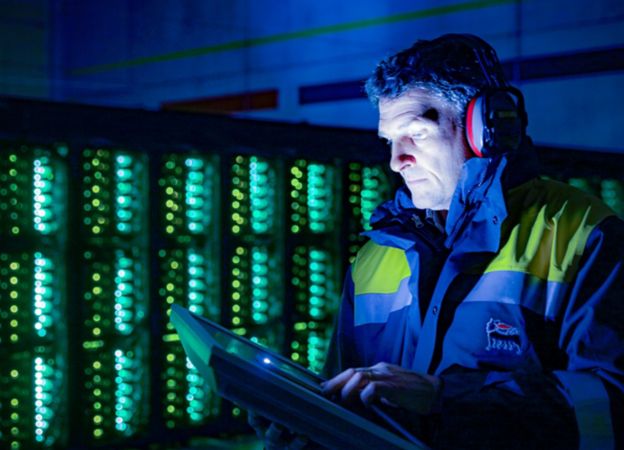1,401
ha
contaminated land undergoing reclamation

Or , our new artificial intelligence tool.
We are activating projects for the rehabilitation and recovery of land, water and waste, encouraging their use within new sustainable initiatives.
Through Eni Rewind, our environmental company, we are engaged in the exploitation of land, water and industrial waste or from reclamation activities, with reclamation and recovery projects. Our approach favours the application of low-impact technologies that avoid the need for excavation and disposal operations, thus reducing waste generation and lowering the carbon footprint of reclamation activities.
At the same time, in the areas where we operate, we build plants for the production of energy from renewable sources: examples are the initiatives launched in Ravenna (Ponticelle), Gela, Assemini, Porto Marghera and Porto Torres.
At our research centres, we develop technologies to increase environmental sustainability, the effectiveness and energy efficiency of our industrial site reclamation activities.
Filtration technologies to remove hydrocarbons from groundwater. The latter, in particular, won the Innovation Award at the Eni Awards.
A technique to recover contaminated soil by identifying combinations of plants and microorganisms capable of capturing and degrading heavy metals and hydrocarbons in the soil.
Passive sampling on polyethylene film is used to verify the distribution of organic contaminants to target site remediation.
With this method we check the status of contaminants to assess opportunities for biological treatment.
The results of our environmental reclamation activities in 2023.¹⁾
contaminated land undergoing reclamation
available for new development initiatives by 2030
land will be reclaimed by 2050
Through our research centres, we have developed reclamation technologies that minimise the production of industrial waste.

We have developed two systems to recover hydrocarbons dispersed in groundwater, both those on the surface and on the bottom.

We use plants and special microorganisms for the environmental remediation of soils from pollutants.
Other examples of technologies we apply in remediation activities.
The e-limina® method combines microbiological, molecular and isotopic monitoring systems to establish the state of biodegradation of contaminants and assess the applicability of biological technologies for site remediation.
LDPE is low-density polyethylene, which is used in plastic bags. Passive sampling on polyethylene film quantifies the distribution of organic contaminants in sediments and soils of volatile organic compounds in soil gas, allowing targeted environmental interventions to be identified.
A well-established system for securing and reclaiming groundwater: in a closed circuit, water is extracted, treated and re-injected into the ground at a lower concentration than when it was extracted and at a different depth.
Other examples of technologies we apply in remediation activities.
The e-limina® method combines microbiological, molecular and isotopic monitoring systems to establish the state of biodegradation of contaminants and assess the applicability of biological technologies for site remediation.
LDPE is low-density polyethylene, which is used in plastic bags. Passive sampling on polyethylene film quantifies the distribution of organic contaminants in sediments and soils of volatile organic compounds in soil gas, allowing targeted environmental interventions to be identified.
A well-established system for securing and reclaiming groundwater: in a closed circuit, water is extracted, treated and re-injected into the ground at a lower concentration than when it was extracted and at a different depth.
With the aim of increasing sustainability, work quality and safety, with Eni Rewind we manage groundwater treatment plants (TAF) using the best available technologies. One example is the new dynamic control system, which allows real-time intervention in TAF plant operating parameters such as pressure, flow rate and phper to allow the plant the ideal conditions to function.
In addition, we manage the cycle of waste produced by the group's industrial activities or from environmental remediation and decommissioning operations, ensuring daily control of the supply chain in compliance with current regulations. We adopt technological and logistical solutions to increase the proportion of waste sent for recovery, to minimise the distance travelled between the production site and the delivery facilities, with a subsequent reduction in costs and environmental impact. Using established in-situ technologies, such as bio-stacking and soil washing, we maximise soil recovery while ensuring the environmental sustainability of the reclamation efforts.
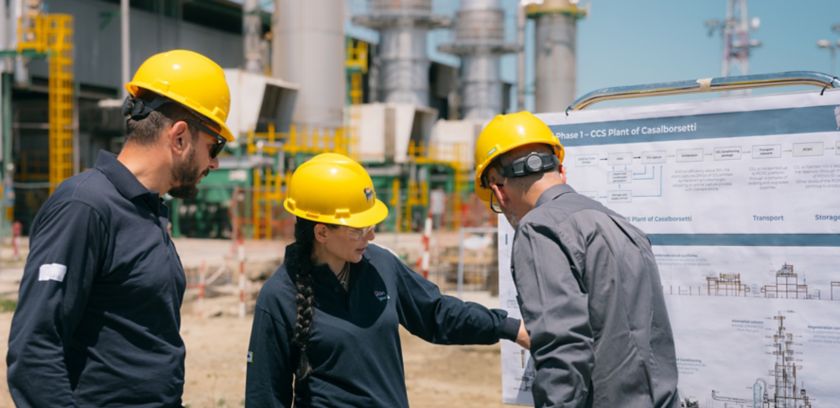
From natural gas to circular chemistry, from electricity to CO₂ capture and storage: in Ravenna we design the future of energy.
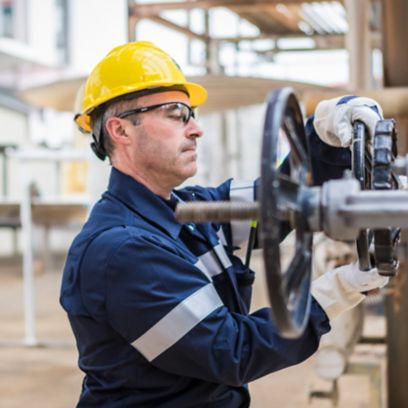
New industrial projects in early 2023 will develop the energy transition, CO₂ reduction and the circular economy.
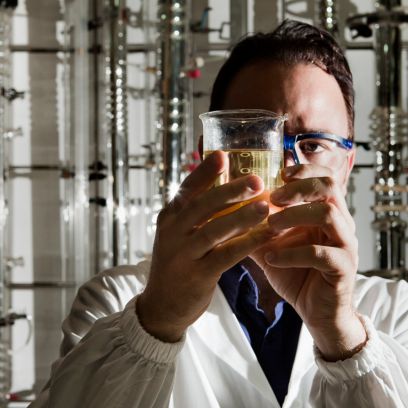
The first plant for chemicals from renewable sources is in operation and we are also engaged in the environmental reclamation of brownfield sites.
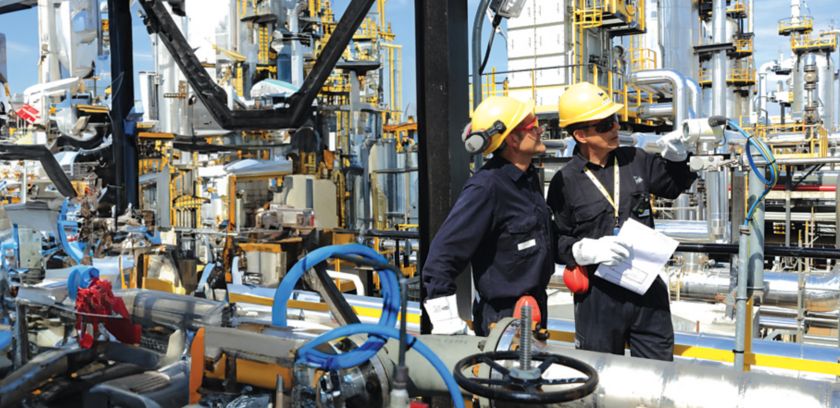
It is a positive transformation, which starts with the biorefinery and is complemented by an integrated programme that gives value to the region.

If you want to change topic, clear the chat and make a new query to receive more relevant results.
This will delete the question history.
If you want to change topic, clear the chat and make a new query to receive more relevant results. This will delete the question history.
Here you can find the full list of your queries.
The answers are generated by artificial intelligence, therefore they may contain inaccuracies. Please read the terms and conditions of use.

EnergIA is an innovative tool based on artificial intelligence capabilities, which can help you navigate the contents of eni.com, quickly finding answers to your questions. EnergIA can also perform a search on a specific topic, providing the most up-to-date data available, or it can invite you to delve deeper into a topic of your interest by suggesting links and specific readings. Start now!
EnergIA is an innovative tool based on artificial intelligence capabilities, which can help you navigate the contents of eni.com, quickly finding answers to your questions. Start now!
EnergIA (ener'dʒia) is a system based on Generative Artificial Intelligence.
Thanks to this technology, we can respond to your requests by querying the most relevant content and documents available on eni.com. (Note: financial documents from the last 12 months and press releases from the last 2 years are considered.)
Through EnergIA, you can delve into topics of interest and have a real-time window into the world of Eni.
If you wish to search for a specific document, press release or news, use the traditional search engine via the magnifying glass icon.
Like all systems that leverage Generative Artificial Intelligence, EnergIA may generate inaccurate or outdated responses. Always consult the sources that EnergIA proposes as the origin of the generated information.
If the system fails to find an exact match for the requested content, it still tends to provide a response.
If you find any inaccuracies in the provided response, please send us your feedback at the bottom of the page: it will be very helpful for us to improve.
Remember that the content generated by the system does not represent Eni’s official position. We therefore invite stakeholders to refer to their designated contacts for official statements: Press Office for journalists, Investor Relations for analysts and investors, Company Secretariat for shareholders etc..
EnergIA can understand questions posed in almost all languages, but we prefer to provide you with a response in English or Italian, the two languages available on eni.com. If you ask a question in Italian, the content on the site in Italian will be consulted. If you ask it in English or any other language, the content in English will be consulted. (Note: the language Eni uses for financial documents/content is predominantly English.)
If questions are formulated that violate the set security criteria, the system will not proceed with processing the response. Please remember not to send personal data.
By using this service, the users acknowledge that they have read and accepted the terms and conditions of use.
Search
EnergIA (ener'dʒia) is a system based on Generative Artificial Intelligence.
Thanks to this technology, we can respond to your requests by querying the most relevant content and documents available on eni.com. (Note: financial documents from the last 12 months and press releases from the last 2 years are considered.)
Through EnergIA, you can delve into topics of interest and have a real-time window into the world of Eni.
If you wish to search for a specific document, press release or news, use the traditional search engine via the magnifying glass icon.
Like all systems that leverage Generative Artificial Intelligence, EnergIA may generate inaccurate or outdated responses. Always consult the sources that EnergIA proposes as the origin of the generated information.
If the system fails to find an exact match for the requested content, it still tends to provide a response.
If you find any inaccuracies in the provided response, please send us your feedback at the bottom of the page: it will be very helpful for us to improve.
Remember that the content generated by the system does not represent Eni’s official position. We therefore invite stakeholders to refer to their designated contacts for official statements: Press Office for journalists, Investor Relations for analysts and investors, Company Secretariat for shareholders etc..
EnergIA can understand questions posed in almost all languages, but we prefer to provide you with a response in English or Italian, the two languages available on eni.com. If you ask a question in Italian, the content on the site in Italian will be consulted. If you ask it in English or any other language, the content in English will be consulted. (Note: the language Eni uses for financial documents/content is predominantly English.)
If questions are formulated that violate the set security criteria, the system will not proceed with processing the response. Please remember not to send personal data.
By using this service, the users acknowledge that they have read and accepted the terms and conditions of use.
A new window into Eni’s world, at your disposal. EnergIA is an innovative tool based on artificial intelligence capabilities, which can help you navigate the contents of eni.com, quickly finding answers to your questions.
